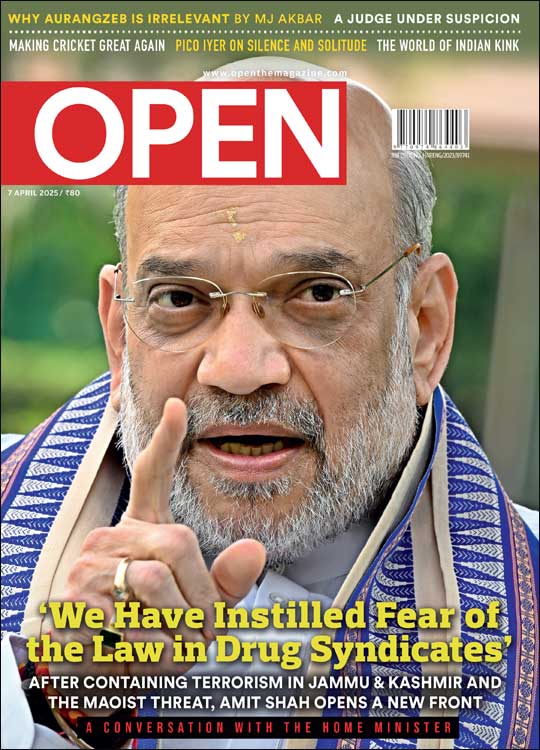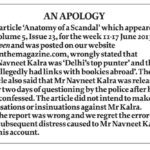Love Jihad
As the BJP seeks another term in Karnataka, Hindutva’s foot soldiers raise a battlecry against cross-community romance
 Anil Budur Lulla
Anil Budur Lulla
 Anil Budur Lulla
|
25 Apr, 2013
Anil Budur Lulla
|
25 Apr, 2013
/wp-content/uploads/2015/11/love-jihad-1.jpg)
As the BJP seeks another term in Karnataka, Hindutva’s foot soldiers raise a battlecry against cross-community romance
Love. Jihad. These two words may mean two different things, but together, they assume political potency. Or so believes the Bharatiya Janata Party (BJP) in Karnataka. As the party nears the end of its first ever full term in power in a South Indian state, with Assembly polls due on 5 May, ‘love jihad’ has become a rallying cry of Sangh Parivar outfits that have risen in defence of Hindu girls who they see as vulnerable to religiously motivated romantic overtures—and scarier moves—made by Muslim boys. And in several places, such as the coastal city of Mangalore, ‘love jihad’ actually appears to have become an electoral issue.
Only a week ago, Karnataka’s Deputy Chief Minister KS Eshwarappa used the term on his campaign trail and was slapped with a notice by the Election Commission for making divisive remarks. It is not just Eshwarappa. Talk to anyone in Mangalore and the conversation seems to veer round to ‘love jihad’. “The BJP affiliates have created a fear psychosis among people here,” says MP Naronha, an advocate. “They have divided even college students—who are [now] scared to talk to classmates of other communities.”
The Congress alleges that Mangalore district, which borders Kerala, has been turned into a Hindutva laboratory, pointing to incidents of the saffron moral brigade attacking partying teenagers, forcibly breaking up suspected friendships between Muslim and non-Muslim college students, ambushing vehicles taking cattle for slaughter, and attacking churches to stop their alleged conversion of Hindus to Christianity.
“Not a day goes by without some form of moral policing activity,” says Ramesh Perla, an independent journalist who has been tracking such events for many years. “Just the other day, youngsters, including girls, who were smoking on the balcony of an ice-cream parlour were attacked by these activists,” he says, “When the police arrived, they took the girls into custody. As soon as tipped-off media photographers started taking pictures, the policemen claimed they were taking the girls to safety and were not really arresting them.”
As a term, ‘love jihad’ was first heard in the northern districts of Kerala, and is now Sangh shorthand for an alleged Muslim plot to convert young Hindu girls to Islam by having Muslim boys entrap them in love affairs. Some Christian groups, too, have raised concerns about this type of ‘jihad’, an Arabic word that literally means ‘struggle’.
With Christians accounting for 22 per cent of the city’s population and Muslims another 18 per cent, Mangalore makes an obvious target for those out to keep youngsters of different faiths apart. Till recently, it was a cosmopolitan and vibrant city with a large number of educational institutions that attract students from across India, but ever since the BJP took charge of Karnataka, it has emerged as a hotspot of saffron vigilantism.
If Sangh activism has risen, so has that of the Karnataka Forum for Democracy, an orthodox Muslim outfit that does its own moral policing. Lately, followers of Islam appear to have gained a new visibility in the city. Malayalee Muslims, many of them loaded with Gulf money, have been making this region their home. Their funds are being used to upgrade mosques here, says a police officer, and in return they have gained influence in these religious places. Mosques are suspected of spreading extremist views, and this has caused unease in some non- Muslim quarters of the city.
Local Sangh outfits in Mangalore, such as the Vishwa Hindu Parishad, Bajrang Dal and Sri Rama Sene, say that they will protect Hindu girls from being ‘stalked’ by boys of ‘other’ communities, lest their social influence grows. Jagadish Shenava, a lawyer and VHP’s district working president, is convinced that ‘love jihad’ is part of an active agenda. “It is true. It is happening. We have saved many girls from becoming victims,” he says. He endorses the Bajrang Dal’s extreme measure of beating up such ‘jihadists’ in public so that others are deterred from daring to try any such trick. “People here are scared. They know they can be a bad influence,” says Shenava, “We are happy to be educating and protecting them on these issues.’’
Pressed for evidence, Shenava urges me to take a daily local train that links Mangalore Central with Kasargod in Kerala. “These trains are packed to the rafters and these men paw our girls who come to Mangalore for education or work,” he says, “They pass lewd remarks or strike up conversations with women, and within months, it leads to love jihad. In the name of marrying these girls, they convert them and later dump them. These girls can’t show their face within the community, as nobody will marry them [anymore].” He adds: “If our boys fall in love with Muslim girls, they get married. But the reverse is not true. Love jihad will affect the entire community.” Asked for corroboration of his contention, Shenava says none of the victims wants to go public. “You ask me, I will confirm, but don’t ask for proof,” he says, “If you want to dig further, check with the police how many girls from the region go missing every year. They are all victims of love jihad.”
A local police officer says the force is very careful when it comes to missing-person complaints. “Even if we succeed in tracing the girl, we will not lodge an official complaint as it is a sensitive matter. If fringe organisations on both sides come to know, they will protest in front of police stations and make a big issue of it, attracting media attention.” In a recent case, a girl who went missing claimed she was married once the police traced her, and even lodged cases against her parents.
Local Bajrang Dal Convenor Sharan Pumpwell speaks of Mangalore as a volatile city: “You don’t know what’s happening here. Mangalore is a very communally sensitive town. We have to keep our eyes and ears open. Anything can happen here anytime.” He feels that moral policing is the only way to keep Hindus safe. “We don’t kill or hurt anyone. We only observe, and hand over wrongdoers to the police,” he says. What he does not mention is that they are thrashed as well. On his laptop, Pumpwell has two passport-size pictures: one of a boy and the other of a girl he claims as a victim of ‘love jihad’. “The couple are now missing and we are doing all we can to trace them. If we don’t educate the community about the dangers of love jihad, who will?” He claims there are many cases like this.
Two cases, in particular, are oft cited by Hindutva activists. Late last year, Sneha, a BEd student who had received an employment letter from the state education department and was all set to become a teacher, was raped and killed on her way home in nearby Bantwal town. The other case is that of Soujanya, another young girl who was raped and killed, and whose body was found near Belthangady earlier this year. According to saffron activists, both were suspected ‘love jihad’ victims and their killers are still at large.
Perla says that saffron outfits used to assume all missing women were victims of ‘love jihad’, but were stunned into silence last year after the arrest of Cyanide Mohan, a serial killer who admitted that he had abducted, raped and killed 21 women in the region.
Still, the noise over an alleged increase in cases of ‘love jihad’ is rising to alarming levels. “But we could not find any such cases,” says Naronha, “It is like Goebbel’s propaganda. A lie told a hundred times becomes ‘the truth’, but there is no evidence.” He feels these canards are being spread by the Sangh to keep intact the BJP’s Hindu support, which is essential to the party’s chances of re-election.
Whether it will work is doubtful. Ordinary Mangaloreans are fed up of saffron goons trying to bully society into behaving how they would like. “It’s not just that they are involved in pub and homestay attacks, church attacks, seizing cows and other such acts of vandalism, they have divided society so badly that the youth are afraid to talk to youngsters of other communities, go out together or even go for that great common excuse—combined studies. Even parents are scared and keep a close watch on where their wards go, or with whom they sup, especially after the homestay and pub attacks,” says Naronha.
If anything, such strongarm tactics appear to have fed into popular disaffection of the state’s ruling BJP government. “They may have claims of more development, but people have been terrorised by their fringe outfits. We can’t complain to the police or politicians. There is a very real threat of physical [attacks],” says AP Mascrenhes, a college student who has seen many moral policing incidents.
She is not alone. Her classmate—who is one of the group of girls who were chased out of a pub and slapped around in full media glare in January 2009—alleges that a section of the local media is also biased in favour of Hindutva. “You can [judge] it from their visuals. The media, tipped off in advance, keep asking the attackers to turn the faces of women being slapped so that the cameras can catch it. [My own experience] was traumatising and humiliating,” she says, requesting anonymity.
The man who claimed responsibility for that pub attack, Pramod Mutalik of the Sri Rama Sene, is currently out of the BJP’s favour as he was keen to contest polls on a party ticket after merging his outfit with it. The attack, he had said, was carried out to guard girls against the influence of Western culture.
One reason that Naronha says he pays attention to talk of ‘love jihad’ is that ultra-conservative reactions against it may affect his Christian community as well. There have also been saffron attacks on churches across Karnataka, including three in Mangalore city on 14 September 2008, that have left Roman Catholics and Syrian Christians livid. To make matters worse, Christians who were protesting the attacks the following day were beaten up by the police.
Naronha, representing them, says 338 Christians—instead of the real culprits—were arrested by the police for protesting those attacks on churches. After a hue and cry was raised, the state government set up the Justice Somashekhar Commission of Inquiry. The churches have been under attack again since then. “This angered the community, as we are not into conversion. In fact, an RTI application revealed that not a single case of conversion was registered in the entire district.” It is, of course, legal.
Naronha believes the attacks were part of a hidden agenda. “The Somashekhar Commission was appointed to lay the foundation for an anti- conversion law in the state. Thankfully, it did not happen because we put forth our arguments very well. The fringe elements also could not produce any evidence of conversion, nor could they produce even one person who had converted. The government accepted a recommendation of the Commission to drop charges against all the 338 Christians who were arrested on charges of violence against policemen.”
Mahendra Kumar, who was then state Bajrang Dal head and who claimed responsibility for the attacks, later left the outfit quietly and is currently mentoring former Chief Minister HD Kumaraswamy’s son, Nikhil Gowda, for his proposed political debut. Kumar could not be reached for comments.
Another election issue in the Mangalore region is Petta Pattunakulu (meaning ‘cow catchers’ in Tulu, a local dialect)—the abduction of cattle headed for slaughter houses. “In this town, beef is staple food for all, including Hindus, especially lower castes,” says Perla.
However, most of those transporting the cattle are Muslims, who often draw the ire of Hindus who consider cows holy and worthy of protection. Particularly active in ‘rescuing’ cows are Hindutva vigilantes of the region’s Billava community. They chase these trucks, block them and hand over the people and cattle to the police, who they expect will take action.
“It has hit [beef consumers] hard as meat and chicken are expensive,” says Perla, adding that the BJP hopes to score points on this issue with Hindus who revere cows—all Hindus, that is, in the Sangh’s estimation. The VHP is vehement that no Hindus eat beef. “We will ex-communicate those who eat beef. Only Communists here eat [beef], and just to prove a point,” says local VHP leader Gopal Kuttar.
Rajgopal Rai, a BJP spokesperson for the district, stoutly defends the vigilante groups that have kept Mangalore in the news for all the wrong reasons. He says the homestay and pub attacks were about battling a ‘bad culture’. “We know that. The Congress party also knows it. In fact, the Christians and Muslims in the city also know it. It boomeranged on us only because of the politics played by pseudo-secularists and so-called intellectuals who ganged up against us.” Representing the Mangalore region (as defined by its Lok Sabha constituency), the BJP has four MLAs in the Karnataka Assembly, while the Congress has an equal number. Rai admits the party lost badly in the recent Mangalore City Corporation polls but insists those were fought on local issues and are not an early indicator of results in the upcoming Assembly polls.
Rai claims that the BJP’s rise to power put an end to communal violence in the state but public memory is too short to credit the party for it. “We are not as bad as the perception created. We are only doing social and cultural work,” says the VHP’s Gopal Kuttar, “We are proud to be known as a Hindu laboratory. We are not bothered about political analysis.”

/wp-content/uploads/2025/03/Cover_Amit-Shah.jpg)











More Columns
A Freebie With Limitations Madhavankutty Pillai
Calling Japan Kaveree Bamzai
Knives Out in the White House Kaveree Bamzai